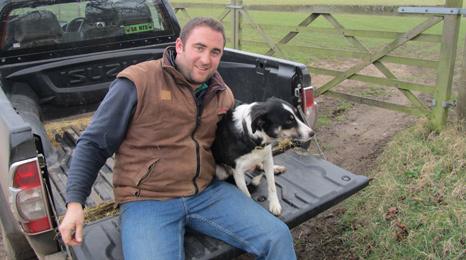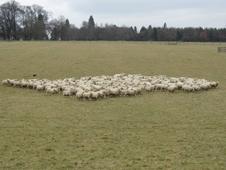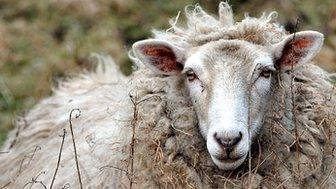Lambing season worry on farms over Schmallenberg virus
- Published

Fears are growing over a disease which causes birth defects and miscarriages in livestock.
Seventy-four UK farms now say they have been affected by the Schmallenberg virus, which can cause ewes to give birth to dead or deformed lambs.
The infection got its name from the German town where it was first seen.
It's thought the virus has been spread across Europe by midges, mosquitoes and ticks.
It can also affect cattle and goats as well as sheep, but humans are thought to be unaffected.
Jamie Burrows, 29, is a farmer at Sandridgebury Farm in Hertfordshire.
He said: "I think the fear at the moment is the unknown, we are about to start lambing here and there are no clinical signs of disease so we won't know whether we're going to be affected until then.
"The disease is here in Hertfordshire now, so we are looking out for it."
Lamb prices
It has been identified in counties across the south of England and Jamie says it's the "waiting around" which is worrying him the most.
"The lambs that are born with the virus are deformed and you often find that their joints are locked," he explained.
"It's not great viewing to be honest and it makes lambing for the ewe very difficult, whereas normally they would lamb unassisted."
Jamie's farm is unaffected by Schmallenberg at the moment, but the impact of the disease on the UK sheep flock won't become clear until the lambing season reaches its peak in a few weeks time.
"The sheep we have here could be affected and we don't know yet," he explained.
"Half of their lambs could be affected so that's 50% losses and a fully grown lamb is between £60 and £80 to us, so it's a lot of money.
"If it affects enough of the UK then this could all affect the price of lamb in supermarkets."
Virus research
The National Farmers' Union (NFU) say cases are being under-reported and Jamie Burrows believes more farmers need to report signs of the disease so further research can be carried out.
There is no known treatment yet and scientists say it could be a couple of years away.

Jamie Burrows says his flock of sheep has not been affected by the virus yet
"The most important thing for us farmers to do is to keep reporting it," said Jamie.
"It won't help that lamb or that ewe but it will help us to track where that disease has been and give us better research."
Unlike the foot and mouth disease in 2001 and Bovine TB last year, the Schmallenberg virus won't lead to farms closing down because there is no threat to humans.
Jamie explained: "There wouldn't be much point of putting movement restrictions in on farms because the midges came over last summer and the damage has already been done."
None of the affected farms have imported animals during 2011 from the affected areas in mainland Europe.
Jamie, like other farmers, is now hoping the virus doesn't affect their livelihood too much.
He said: "The lambs you produce are your income and if that halves overnight that's going to have a massive effect on our business."
- Published27 February 2012
- Published13 March 2012
